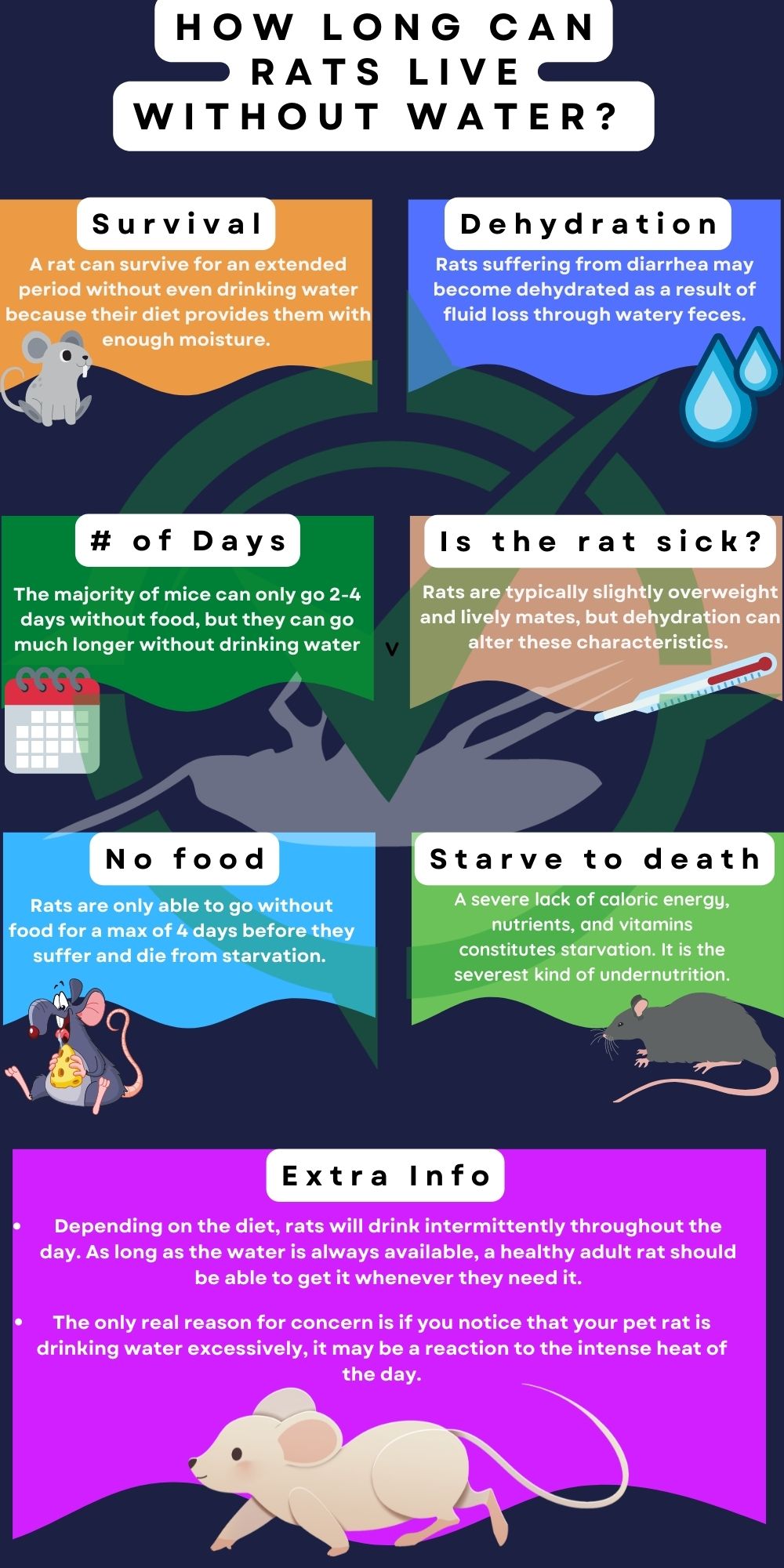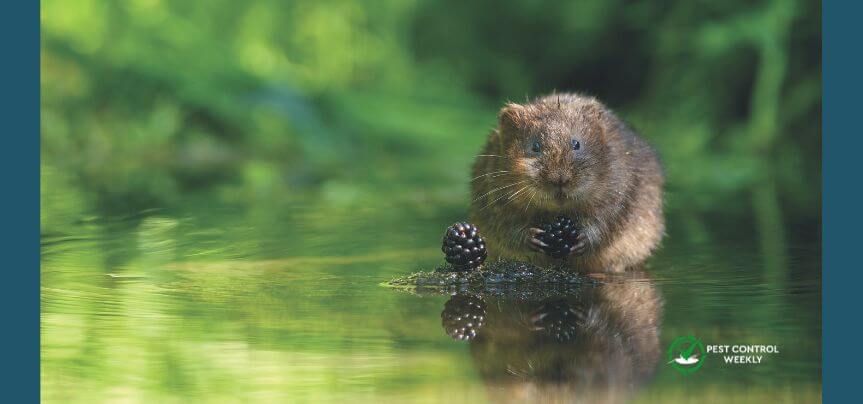A rat’s average lifespan is difficult to determine. If rats have easy access to water, their lifespan can be extended further. How long can rats live without water?
Research has indicated that rats can live without water up to two weeks. Rats can go for up to a month without water if they have food. They can survive for a very long time without significant access to water, but only for four days without food. They will starve after that.
To learn more about rat water requirements, read the article.

How Often Do Rats Need Water?
Rats prefer to build their nests near a food source and consume approximately 30 g of food per day. Water is just as essential to a rat’s survival as food is. A rat typically requires 5 -10 ml of water/100 g of body mass/day.
For a typical rat, this might equate to about 30 ml or 1 ounce of liquid per day, with variations depending on the needs of the particular animal, the atmosphere, and the type of fodder being given—dry feed needs more water, for example.
They will keep a relatively tiny region from their nest to look for food because they are extra careful, attempting to avoid anything different in their region until they’ve had time to become used to it.
How Do Rats Survive Without Water?
All living things require water to avoid dehydration. Drinking water aids digestion regulates body temperature and aids in the elimination of toxins. Rats, like humans, need water to survive.
Different rats will drink small amounts of water frequently, while others will only occasionally go to their source of water for a large drink. They will drink as much as they need to as long as the water is present.
A rat can survive for an extended period without even drinking water because their diet provides them with enough moisture. They stay hydrated because food contains moisture. They have a fast metabolism, which necessitates frequent feeding.
Even types of food that are just too dry for humans to drink have 1-2 glasses of water with will contain sufficient water to sustain rats.
How Long Can Rats stay without water?
Although it varies slightly from region to region and species to species, it is difficult to determine the life expectancy of a rat. The brown rat has an average lifespan of about 2 years, whereas the black rat only lives for about a year. The living conditions are a significant factor in this as well.
Rats receive adequate water from their food to last a long period without drinking any. They stay hydrated because of the moisture in food. These creatures need to eat frequently because of their quick metabolism.
The majority of mice can only go 2-4 days without food, but they can go much longer without drinking water because they typically get all the water they require from the food they eat.
Do Rats Get Dehydrated?
Yes, rats do get dehydrated when they do not have access to water they will quickly become dehydrated. Rats suffering from diarrhea may become dehydrated as a result of fluid loss through watery feces.
Diarrhea is a complicated syndrome caused by several factors. Crowding, poor sanitation, nutritional deficiencies, varying temperature levels, very high or very low humidity, and inadequate ventilation are all associated with diarrhea.
Rats suffering from respiratory infections may become dehydrated as well due to their larger skin area and high respiration rate, evaporate a larger amount of water, and lose more body heat per unit of body mass of rats than larger animals, causing them to dehydrate more quickly.
How Can You Tell If The Rat Is Dehydrated?
Dehydration causes rats to appear thinner than usual. The coat and the eyes may appear dull. An animal’s skin can be gently pinched between the thumb and finger as a traditional test for dehydration.
When a normal rat is released, its skin quickly flattens and returned to its original shape. The skin of a dehydrated rat will gradually flatten a visible grove and may continue to stay for just a few seconds.
A thirsty rat will most likely be less energetic than usual, lethargic, and appear depressed. He might be slouched and not make much movement. He may not want to drink water and show no interest in food. Dehydrated rats should be treated right away by giving them a measured amount of water to drink.
How Do You Keep A Sick Rat Hydrated?
Rats are typically slightly overweight and lively mates, but dehydration can alter these characteristics. A dehydrated rat needs immediate at-home support as well as need to check by the veterinarian.
Emergency veterinary care is necessary for severe dehydration. Water should be sweetened with some sugar and administered to the sick rat through a medicine dropper or oral syringe to get it to drink.
To a 3/4 of warm water, combine a bit of salt and 2 pinches of sugar. To dissolve, stir. A rat’s dehydration will increase if use excessive sugar or salt. Over an hour, provide 1-2 droppers every ten minutes.
After trying to rehydrate the rat, if he doesn’t visibly perk up and start eating and drinking on his own, consult a vet.
How Long can rats survive without food and water?
Water is more crucial to most animals than food. Many species can frequently go for quite a while without food, but they can only last for a very short while without water. This is significantly different in rats.
Without a direct water source, rats can endure for a very long time. Rats can survive for up to 30 days without drinking water. It’s not that they don’t need water; rather, they get most of the fluids they require from the food they eat, which explains why they can survive for such a long time without directly drinking water.
Rats are only able to go without food for a max of 4 days before they suffer and die from starvation. They cannot go for long periods without food, primarily because of their quick metabolism.
How Long Does It Take A Rat To Starve To Death?
A severe lack of caloric energy, nutrients, and vitamins constitutes starvation. It is the severest kind of undernutrition. Prolonged starvation in rats can result in fatal organ damage and untimely death.
After starving, rats can also die from overeating. It’s highly likely that most people could go without food or water for a week, but no longer than two weeks.
For Example, young people will typically pass away within 12-24 hours, while the elderly, sick, and thin people will starve more quickly. Rats will expire from dehydration much more quickly than you will. It also varies depending on a few outside factors, like the temperature and humidity in the area where the dead rat was found.
Why Is My Rat Drinking Lots Of Water?
Depending on the diet, rats will drink intermittently throughout the day. As long as the water is always available, a healthy adult rat should be able to get it whenever they need it.
The only real reason for concern is if you notice that your pet rat is drinking water excessively, it may be a reaction to the intense heat of the day.
An energetic rat may consume more extra water because his body needs more hydration overall, or a dusty environment may cause irritation to their skin, starting to cause them to drink plenty of water in an effort to cleanse the toxic compounds from their system.
Another reason for the over rate of consumption in many rats may be an indication of serious medical issues like kidney disease.
Conclusion
Numerous studies have suggested that the maximum amount of time rats should go without food or water is almost two weeks. However, there isn’t any concrete evidence to support this claim.
If they have food, rats can survive for up to a month without water. They can go for very long periods of time without having any real access to water, but they can only go for four days without food.
A rat needs water to survive just as much as it needs food. Rats that drink water have better digestion, better body temperature control, and better toxin elimination.
Rats appear thinner than usual when dehydrated. Traditional methods for determining whether an animal is dehydrated involve gently pinching its skin between the thumb and finger. Rats will experience much faster dehydration-related death.
References
- Food and water intake, growth, and adiposity of Sprague-Dawley rats with diet board for 24 months.
- Three Water Restriction Schedules Used in Rodent Behavioral Tasks Transiently Impair Growth and Differentially Evoke a Stress Hormone Response without Causing Dehydration
